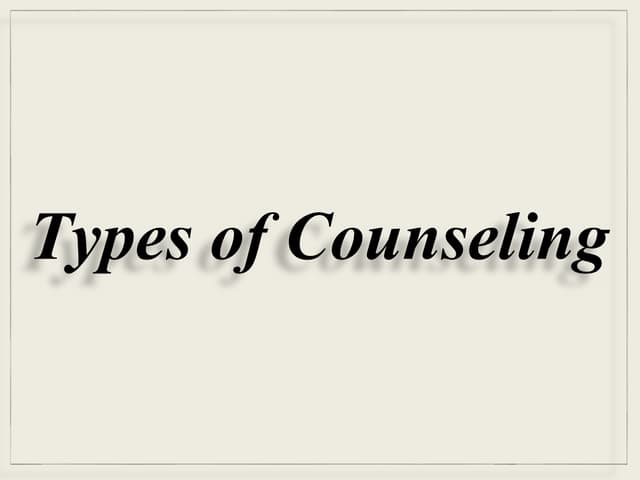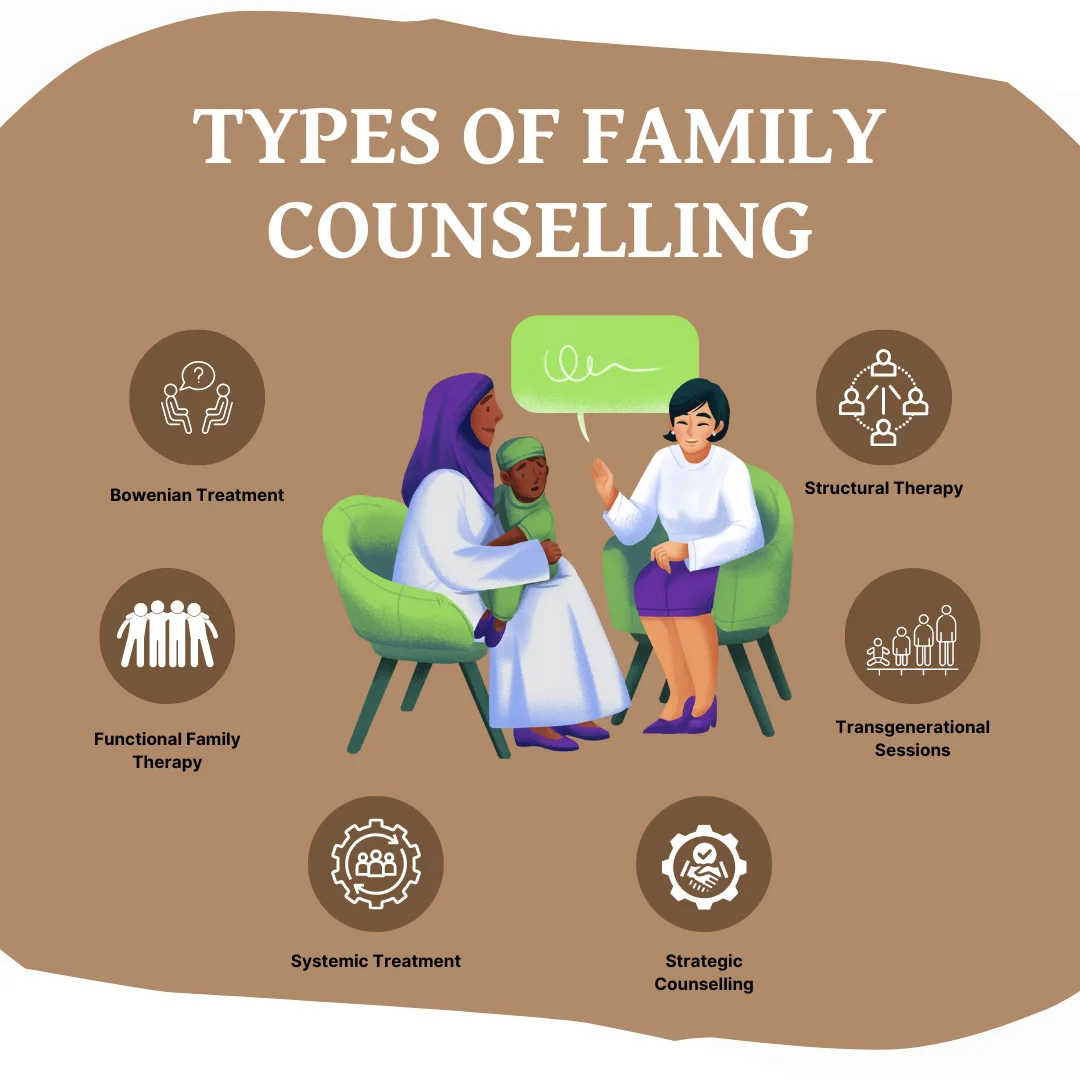Discover All Regarding the Various Types of Therapy Available Today
The landscape of counselling today provides a diverse variety of options tailored to meet differing psychological health and wellness requirements. From individual sessions resolving personal struggles to team settings that foster shared experiences, each kind serves a distinctive function (virtual therapy). Pairs and household treatments concentrate on relationship dynamics, while innovative methods like art therapy urge expression. Comprehending these various approaches can reveal useful devices for navigating life's challenges. What could be the appropriate suitable for you or a person you recognize?
Private Counselling

The procedure normally entails establishing personal objectives and developing dealing strategies tailored to the individual's circumstances. Strategies may consist of cognitive-behavioral therapy, psychodynamic therapy, or mindfulness methods, depending on the customer's choices and needs.
Private coaching empowers clients to obtain insights into their feelings and develop abilities to handle life's difficulties properly. This individually interaction promotes self-discovery, eventually bring about personal growth and boosted psychological well-being. low cost therapy. For lots of, it comes to be an essential resource in maneuvering the complexities of life and discovering a course to emotional resilience
Couples Counselling
Couples counselling offers a structured environment for partners to deal with connection difficulties and enhance interaction. It commonly concentrates on issues such as dispute resolution, intimacy, and trust. Individuals can anticipate directed conversations that promote understanding and foster healthier interactions.

Benefits of Couples Coaching
While partnerships commonly deal with challenges that can seem insurmountable, pairs counselling supplies a pathway to understanding and resolution. This type of therapy offers pairs with a safe area to discover their sensations and communicate much more successfully. With directed sessions, partners can determine patterns of actions, boost problem resolution abilities, and foster deeper psychological connections. Pairs counselling can also enhance common regard and understanding, allowing people to express their requirements and problems freely. By working with an experienced therapist, pairs can get valuable insights into their connection characteristics. Eventually, the benefits of couples counselling extend past instant problems, advertising healthier, a lot more durable collaborations that can adapt to future challenges.
Common Problems Dealt With
Numerous relationships encounter a selection of usual concerns that can be properly addressed via couples counselling. Interaction troubles commonly emerge, bring about misconceptions and disputes. Couples may fight with emotional disconnection, which can produce sensations of isolation and resentment. Count on issues frequently appear, specifically after adultery or deceit, affecting the foundation of the relationship. Additionally, distinctions in values or life objectives can trigger significant tension. Economic anxiety can likewise strain collaborations, as differences concerning spending and conserving can lead to dispute. Taking care of parenting responsibilities can produce rubbing for pairs handling child-rearing obstacles. By addressing these problems in an encouraging atmosphere, pairs counselling assists companions acquire insights, develop healthier interaction techniques, and job in the direction of fixing their distinctions.

What to Anticipate
Taking part in couples counselling can be a transformative experience for companions looking for to resolve their partnership difficulties. During sessions, pairs can anticipate a secure setting where they can freely interact their feelings and issues. A skilled specialist will assist conversations, helping partners to determine patterns, boost communication abilities, and create healthier conflict resolution techniques.
Pairs typically take part in both individual and joint sessions, allowing for diverse perspectives on the issues at hand. The specialist may assign workouts or research to reinforce skills discovered during sessions. As pairs progression, they may experience enhanced compassion and understanding in the direction of each various other, eventually functioning in the direction of rebuilding trust and intimacy. On the whole, pairs counselling objectives to foster a more powerful, extra durable partnership.
Family members Therapy
Household therapy offers as a crucial resource for dealing with interpersonal characteristics within households. This restorative method concentrates on enhancing interaction and solving conflicts amongst relative. By taking part in family therapy, individuals can discover to understand one another's viewpoints, promoting empathy and collaboration.
Specialists usually use different methods to promote conversations, discover underlying issues, and advertise healthier partnerships. Sessions may include all household participants or focus on specific people, relying on the requirements of the family. The therapist's function is to give a risk-free setting where each member can share their thoughts and feelings without judgment.
Household therapy can be advantageous for a series of concerns, including divorce, despair, parenting difficulties, and psychological health problems. Inevitably, this type of treatment intends to enhance domestic bonds, boost psychological support, and outfit households with tools to navigate difficulties, adding to overall family health.
Team Coaching
People might really feel separated in their struggles, group therapy supplies a helpful environment where they can connect with others facing similar challenges. This type of counselling usually includes little teams led by a qualified facilitator, permitting individuals to share experiences and understandings in a secure room.
Group counselling cultivates a sense of community and belonging, which can be particularly beneficial for those managing concerns such as dependency, anxiousness, or pain. Participants often discover convenience in understanding that they are not the only one in their feelings, resulting in increased empathy and understanding.
The interaction within the team can also help with individual development, as individuals obtain feedback and support from peers that may supply various viewpoints. Eventually, team therapy offers as an effective tool for recovery, promoting both specific and collective progress as participants interact towards common goals.
Art and Play Treatment
Art and play therapy gives a creative outlet for people, specifically children, to share feelings and experiences that may be challenging to verbalize verbally. This restorative technique utilizes artistic activities and play to promote interaction, permitting people to explore their feelings in a safe and encouraging environment. With attracting, painting, or participating in play situations, customers can communicate their inner thoughts and feelings without the restrictions of language.
Specialists learnt this modality observe the communications and productions of their clients to acquire understandings into their moods and psychological challenges. relationship therapy. The non-threatening nature of art and play can be especially useful for youngsters that could have problem with traditional talk therapy. In addition, it advertises self-worth and analytic abilities, urging individual growth. Generally, art and play treatment acts as an effective means of healing, helping with emotional expression and understanding for individuals of all ages
Cognitive Behavioral Treatment (CBT)
Cognitive Behavior Modification (CBT) is based in the core principle that thoughts, feelings, and behaviors are interconnected. This therapeutic approach employs different methods and techniques to test negative idea patterns and advertise much healthier responses. The advantages of CBT are well-documented, making it a preferred option for people seeking reliable mental health treatment.

Core Concepts of CBT
How do ideas affect emotions and behaviors? Cognitive Behavior Treatment (CBT) runs on the premise that cognitive processes form a person's sensations and activities. This therapeutic method highlights the interconnectedness of thoughts, emotions, and behaviors, suggesting that maladaptive thought patterns can cause unfavorable psychological states and purposeless actions. One core concept of CBT is the recognition and alteration of these altered thoughts, enabling individuals to create healthier cognitive frameworks. Additionally, CBT promotes the idea of personal obligation, motivating customers to take an energetic duty in their recovery procedure. Via organized sessions, customers learn to challenge illogical beliefs, inevitably promoting durability and boosted emotional policy. This emphasis on cognitive restructuring differentiates CBT from various other restorative methods.
Methods and Methods
Although different techniques and strategies exist within Cognitive Behavior modification (CBT), they all aim to facilitate positive change by addressing maladaptive idea patterns. One noticeable method is cognitive restructuring, which includes here identifying and challenging negative ideas. Clients learn to change these beliefs with even more well balanced, sensible ideas. Behavioral activation is one more method, urging individuals to take part in activities that enhance state of mind and lower avoidance. Direct exposure therapy, generally utilized for stress and anxiety problems, slowly exposes customers to been afraid circumstances, aiding to decrease their anxiousness reactions. Furthermore, mindfulness methods might be integrated, advertising present-moment awareness and lowering rumination. Collectively, these approaches empower people to develop much healthier coping systems and boost psychological policy, laying the groundwork for enduring modification.
Benefits of CBT Therapy
CBT therapy supplies various advantages that add to its popularity as a healing approach. One considerable benefit is its organized format, which enables clients to establish particular objectives and gauge progress successfully. This ambitious nature enhances motivation and responsibility. Furthermore, CBT outfits people with practical abilities and approaches to manage negative thoughts and habits, advertising lasting self-help. Research study shows its performance in dealing with numerous conditions, including anxiety, depression, and stress-related disorders. CBT sessions are commonly shorter in duration compared to other therapies, making it extra obtainable for those with time restraints. Generally, the combination of its evidence-based approaches and concentrate on empowering clients makes CBT a compelling option for numerous seeking psychological health assistance.
Regularly Asked Questions
Just how Do I Pick the Right Kind Of Coaching for Me?
Picking the ideal sort of counselling entails evaluating individual demands, choices, and goals. Researching various techniques, consulting specialists, and thinking about individual convenience degrees are important action in making an educated decision for reliable assistance.
What Credentials Should a Therapist Have?
When considering credentials for a therapist, one must search for a relevant level, specialist certification, and licensure. In addition, experience in particular healing methods and ongoing expert growth are crucial for efficient therapy practice.
How much time Does Each Therapy Session Generally Last?
Normally, each counseling session lasts in between 45 to 60 minutes. Durations can differ depending on the therapist's technique, client needs, and particular healing objectives, making certain both versatility and performance in the counseling process.
Is Therapy Covered by Health Insurance Plans?
Counselling coverage differs by health insurance coverage plans. Some strategies consist of psychological wellness services, while others may have restrictions or need certain service providers. It is necessary for people to inspect their policy information for exact details.
Can Coaching Be Done Online or Virtually?
Counselling can indeed be conducted online or virtually, allowing individuals to accessibility therapy from the convenience of their homes. This approach has acquired appeal, giving adaptability and ease for both clients and professionals in the field.